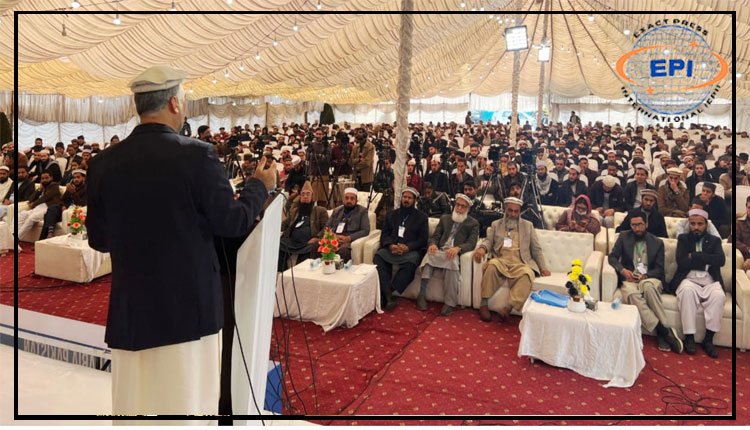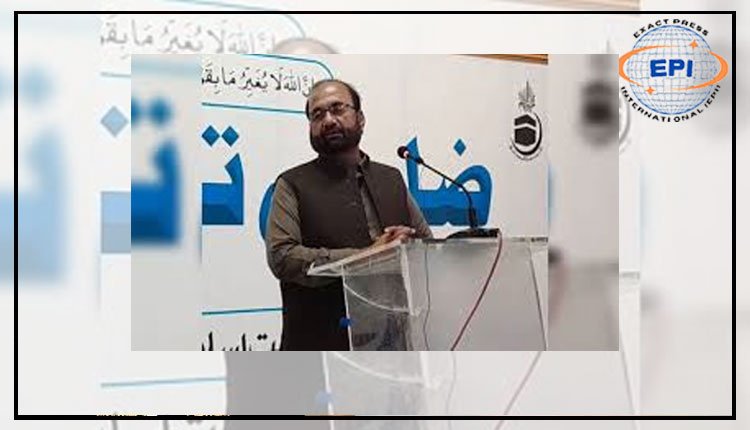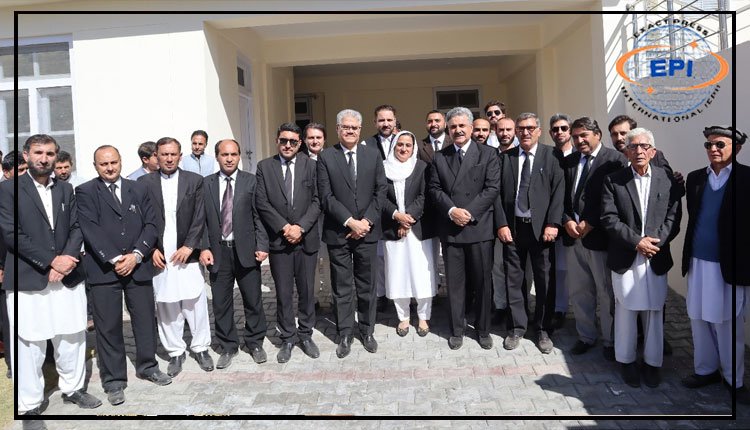Parliamentarians for food Governance in Pakistan: A major initiative of Chairman Gilani to secure Nation’s food & health future
ISLAMABAD, May 02 (EPI): “We face a silent epidemic—where one population starves, while another consumes empty calories. Without urgent policy action, the health and economic costs will spiral out of control.” These powerful remarks set the tone for a critical consultative session on “Food Governance and Non-Communicable Diseases (NCDs),” held today at the Parliament House.
In line with the Chairman Senate’s vision to prioritize food governance as a national policy priority, the session marked an important initiative of the Honorable Chairman Senate to formalize a specialized working group as “Parliamentarians for Food and Nutrition Governance in Pakistan”.
This forum will serve as a cross-party, multi-stakeholder platform to guide policy formulation, legislative proposals, and oversight related to food systems, nutrition, and health in Pakistan.
In this regard, a consultative session on “Food Governance and Non-Communicable Diseases (NCDs)” was held at the Parliament House. Organized by the PDU, Senate Secretariat, in collaboration with Impact Research International, Nutrition International, and its partners, the session brought together senators, experts, and stakeholders to chart a course for healthier food systems in Pakistan. It aimed to initiate dialogue, propose policy recommendations, and enhance accountability mechanisms within the existing food and nutrition governance landscape.
Opening the session, Rida Qazi, Advisor to the Chairman Senate, emphasized the urgency of addressing Pakistan’s food governance landscape, raising an urgent call to action on food safety for the nation’s 240 million people.
She highlighted the integral role of parliamentarians in ensuring that food and nutrition becomes a part of the national conversation.
She outlined Chairman Gilani’s vision for the launch of this working group that will assess the growing impact of unsafe food on the collective health of the country with crucial input from the members of the Senate for food-related policy guidance and oversight of the sector – aligning with the United Nations Sustainable Development Goals (SDGs), specifically Goal 2 (Zero Hunger) and Goal 3 (Good Health and Well-being).
Zubair Faisal Abbasi (Executive Director of Impact Research International) briefed members of the Senate that Non-communicable Diseases (NDCs) are the leading cause of death globally. With 60% of deaths in Pakistan linked to NCDs—including heart disease, diabetes, and cancer. Highlighting the alarming rise of diabetes in Pakistan, he explained that more than 40 percent of Pakistanis are obese.
This, he explained, is largely driven by poor dietary habits and a lack of physical activity. A representative from Novo Nordisk, Saad Tanveer added that there are 34.5 million Pakistanis affected by diabetes, costing the economy $2.7 billion annually.
Abbasi further highlighted the paradoxical nutrition crisis facing the country, where one segment of the population suffers from undernutrition and food insecurity, while another consumes unhealthy, high-calorie diets.
This dual burden, he warned, is creating a silent epidemic with far-reaching implications for public health and the economy, calling for urgent policy action and preventive strategies. Poor diets and sedentary lifestyles fuel this crisis, exacerbated by processed foods and outdated agricultural policies.
Zameer Haider (Program Manager of Nutrition International), added that mandatory wheat flour fortification to combat micro nutrient deficiencies is the need of the hour. In this regard, a legislative proposal is ready and to be shared with the parliamentary working group on food governance.
In addition, FAO, Pakistan, representative, Amna Bajwa highlighted the deep-rooted structural flaws in Pakistan’s agriculture sector, arguing that the country’s crop choices are contributing to the national health crisis.
She noted that current agricultural practices prioritize high-yield but unhealthy crops—particularly those that contribute to rising sugar levels—over more nutritious and health-friendly alternatives. Furthermore, Mr. Bilal Ijaz Gilani (Executive Director Gallup Pakistan) shared his experiences regarding health surveys and proposed innovative survey techniques to collect the data for effective evidence-based policies.
Senator Zeeshan Khanzada and Senator Masroor Ahsan expressed their full support for these initiatives. Senator Masroor Ahsan, Chairman Senate Standing Committee on National Food Security and Research, stressed the importance of addressing fundamental food security issues and called for relevant legislation to strengthen the system. Despite the presence of relevant departments, the implementation of these measures remains weak due to growing market competition.
However, he noted that this platform offers a valuable opportunity to advance these critical issues. Senator Masroor Ahsan expressed deep concern over the continued reliance on outdated agricultural practices in Pakistan, stating that such methods are no longer sustainable in meeting the country’s growing food demands.
He called for adopting smart agriculture initiatives—leveraging modern technology, data-driven solutions, and climate-resilient techniques—to significantly enhance crop yields and ensure long-term food security.
Senator Zeeshan Khanzada, Chairman Senate Standing Committee Human Resource Development, expressed serious concerns over the alarming rates of malnutrition and stunted growth among children in Pakistan.
He said that these issues reflect deep-rooted challenges in the country’s food and health systems, and stressed the need for immediate policy interventions to safeguard the well-being of future generations.
The session also discussed essential measures to promote a healthier population and reduce long-term health and economic burdens, including front-of-pack warning labels, taxes on unhealthy foods, improved food environments in schools and hospitals, advertisement restrictions on harmful products, and conflict-of-interest policies within food governance.
There was consensus on shifting food policy away from excessive reliance on grains and sugar, towards promoting affordable, nutritious alternatives like pulses. Government support for these initiatives was highlighted as crucial to creating a balanced and sustainable food system. Additionally, the a need for mandatory wheat flour fortification to combat micro nutrient deficiencies.
The session concluded with a strong commitment from participating senators and stakeholders working together for effective and sustainable food governance in Pakistan and to operationalize the working group that will be formally launched by the Chairman Senate in the coming weeks and will serve as a permanent mechanism to sustain dialogue, formulate policies, and ensure legislative oversight on food and nutrition governance.
Ends-Exact Press International-Abid Ali Arain











